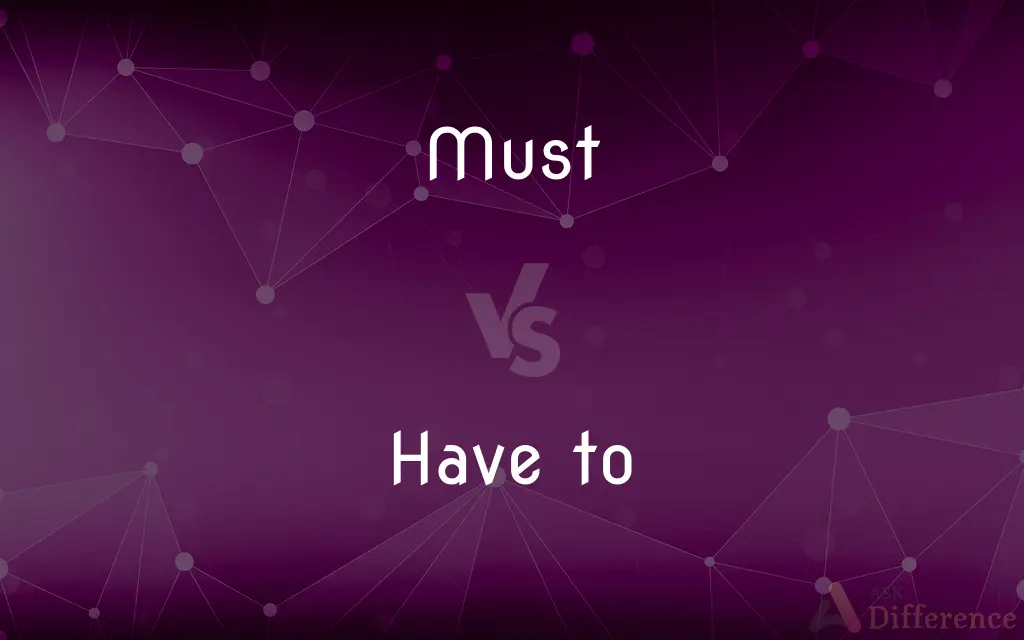Must vs. Have to — What's the Difference?
Edited by Tayyaba Rehman — By Fiza Rafique — Published on December 25, 2023
"Must" indicates a personal obligation or internal necessity, while "Have to" denotes an external obligation or requirement.

Difference Between Must and Have to
Table of Contents
ADVERTISEMENT
Key Differences
"Must" often conveys a stronger sense of necessity or urgency. It typically implies a personal conviction or an inherent need. For example, one might say, "I must exercise daily for my health." On the contrary, "Have to" usually indicates an external obligation or something enforced by outside circumstances or another individual. "I have to attend the meeting because my boss said so."
While both "Must" and "Have to" can denote obligation, "Must" might be perceived as a more immediate or pressing requirement. "I must finish this assignment now." "Have to" can sometimes offer a little more leeway, such as "I have to finish this assignment by Friday."
In certain contexts, "Must" can also imply a recommendation or a strong suggestion. If someone says, "You must see that movie," it means they highly recommend it. However, "Have to" is less likely to be used in this manner. It's rare to hear someone say, "You have to see that movie," unless there's an external reason compelling it.
From a grammatical standpoint, "Must" is a modal verb and doesn't change its form. "Have to," meanwhile, is a regular verb and can be conjugated. For instance, "She must go" versus "She has to go."
While both phrases can sometimes be used interchangeably, nuances in tone and context will dictate the best choice. In a more formal or emphatic context, "Must" may be preferred. In everyday speech, especially in American English, "Have to" might be more commonly heard.
ADVERTISEMENT
Comparison Chart
Origin of Obligation
Internal/personal necessity.
External requirement.
Intensity
Often conveys stronger necessity.
Might offer more leeway.
Grammatical Nature
Modal verb (doesn't change form).
Regular verb (can be conjugated).
Contextual Usage
Recommendation or strong suggestion.
Less likely to imply recommendation.
Common Usage
Formal or emphatic contexts.
Everyday speech, especially in American English.
Compare with Definitions
Must
Must indicates a strong necessity or obligation.
I must quit smoking for my health.
Have to
Have to implies an imposed requirement.
We have to wear uniforms at work.
Must
Must might convey personal conviction.
I must stand up for what's right.
Have to
Have to denotes an external obligation.
I have to pay my bills every month.
Must
Must can imply a strong recommendation.
You must try the chocolate cake at that bakery.
Have to
Have to might indicate a scheduled activity.
I have to attend a conference next week.
Must
To be obliged or required by morality, law, or custom
Citizens must register in order to vote.
Have to
Have to can suggest unavoidable circumstances.
If it rains, we'll have to cancel the picnic.
Must
To be compelled, as by a physical necessity or requirement
Plants must have oxygen in order to live.
Have to
Have to can express societal or legal rules.
Drivers have to obey traffic laws.
Must
Used to express a command or admonition
You must not go there alone. You simply must be careful.
Must
To be determined to; have as a fixed resolve
If you must leave, do it quietly.
Must
Used to indicate inevitability or certainty
We all must die.
Must
Used to indicate logical probability or presumptive certainty
If the lights were on, they must have been at home.
Must
To be required or obliged to go
"I must from hence" (Shakespeare).
Must
Something that is absolutely required or indispensable
Promptness on the job is a must. Comfortable boots are a must when going on a hike.
Must
The quality or condition of being stale or musty.
Must
The unfermented or fermenting juice expressed from fruit, especially grapes.
Must
Variant of musth.
Must
Musk.
Must
To do with certainty; indicates that the speaker is certain that the subject will have executed the predicate.
If it has rained all day, it must be very wet outside.
You picked one of two, and it wasn't the first: it must have been the second.
Must
To do as a requirement; indicates that the sentence subject is required as an imperative or directive to execute the sentence predicate, with failure to do so resulting in a failure or negative consequence.
Must
Used to indicate that something that is very likely, probable, or certain to be true.
The children must be asleep by now.
Must
(transitive) To make musty.
Must
(intransitive) To become musty.
Must
Something that is mandatory or required.
If you're trekking all day, a map is a must.
Must
The property of being stale or musty.
Must
Something that exhibits the property of being stale or musty.
Must
Fruit juice that will ferment or has fermented, usually from grapes.
Must
To be obliged; to be necessitated; - expressing either physical or moral necessity; as, a man must eat for nourishment; we must submit to the laws.
Must
To be morally required; to be necessary or essential to a certain quality, character, end, or result; as, he must reconsider the matter; he must have been insane.
Likewise must the deacons be grave.
Morover, he [a bishop] must have a good report of them which are without.
Must
The expressed juice of the grape, or other fruit, before fermentation.
No fermenting must fills . . . the deep vats.
Must
Mustiness.
Must
To make musty; to become musty.
Must
Being in a condition of dangerous frenzy, usually connected with sexual excitement; - said of adult male elephants which become so at irregular intervals, typicaly due to increased testosterone levels.
Must
A necessary or essential thing;
Seat belts are an absolute must
Must
Grape juice before or during fermentation
Must
The quality of smelling or tasting old or stale or mouldy
Must
Highly recommended;
A book that is must reading
Must
Must can suggest a prohibitive action.
You must not speak during the exam.
Must
Must often signifies an inherent need.
Humans must breathe to live.
Common Curiosities
How is Have to different from Must?
"Have to" often denotes an external obligation or requirement.
What does Must mean?
It indicates a strong necessity, obligation, or recommendation.
Can Must and Have to be used interchangeably?
Sometimes, but nuances in tone and context can dictate the best choice.
Can Must suggest a recommendation?
Yes, like "You must try this dish."
Is Must a modal verb?
Yes, and it doesn't change its form.
What's an example of Have to indicating a rule?
"Children have to attend school."
Which term is more formal?
"Must" might be perceived as more formal or emphatic.
Can Have to imply a scheduled activity?
Yes, like "I have to meet my friend at 5 PM."
Do both terms always indicate present obligations?
No, they can reference past or future obligations as well.
Which is stronger, Must or Have to?
"Must" typically conveys a stronger or more immediate necessity.
Can Have to be conjugated?
Yes, it's a regular verb (e.g., she has to, they had to).
How is Must used in prohibitive actions?
It can be used as "must not" to indicate something that shouldn't be done.
Which is more common in American English?
"Have to" is often more commonly used in everyday speech.
Is Must always about obligations?
Not always, it can also indicate a strong suggestion or inherent need.
Can Have to denote unavoidable circumstances?
Yes, such as "If it's snowing, we'll have to stay indoors."
Share Your Discovery

Previous Comparison
Full Bed vs. Double Bed
Next Comparison
MHC Class 1 vs. MHC Class 2Author Spotlight
Written by
Fiza RafiqueFiza Rafique is a skilled content writer at AskDifference.com, where she meticulously refines and enhances written pieces. Drawing from her vast editorial expertise, Fiza ensures clarity, accuracy, and precision in every article. Passionate about language, she continually seeks to elevate the quality of content for readers worldwide.
Edited by
Tayyaba RehmanTayyaba Rehman is a distinguished writer, currently serving as a primary contributor to askdifference.com. As a researcher in semantics and etymology, Tayyaba's passion for the complexity of languages and their distinctions has found a perfect home on the platform. Tayyaba delves into the intricacies of language, distinguishing between commonly confused words and phrases, thereby providing clarity for readers worldwide.













































